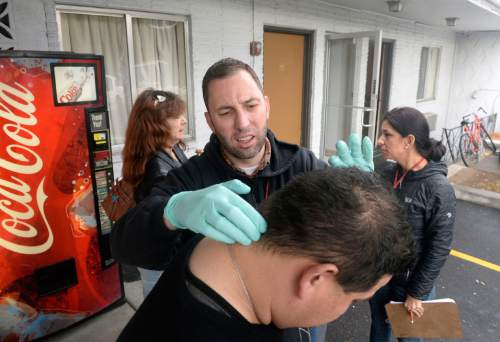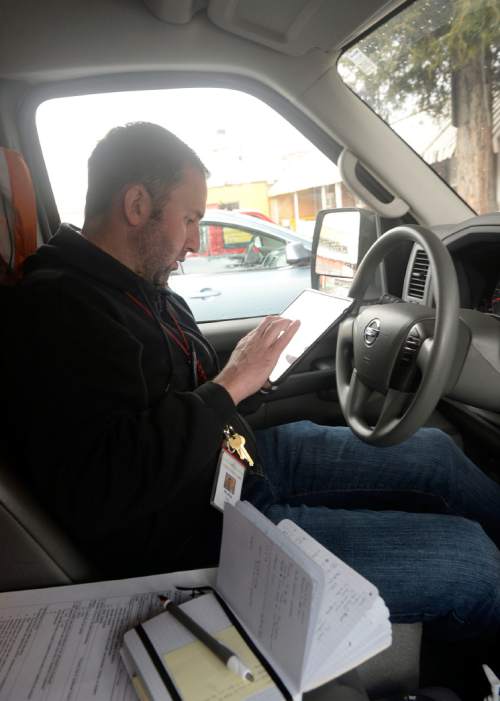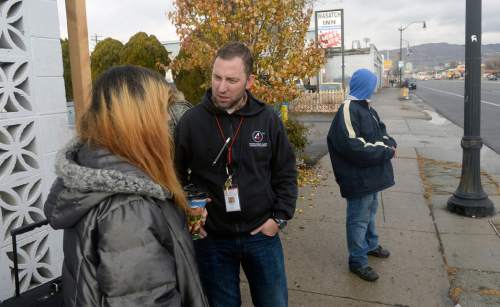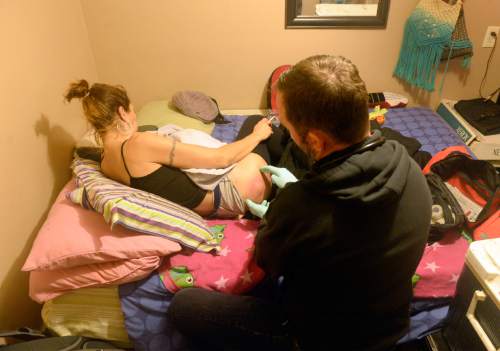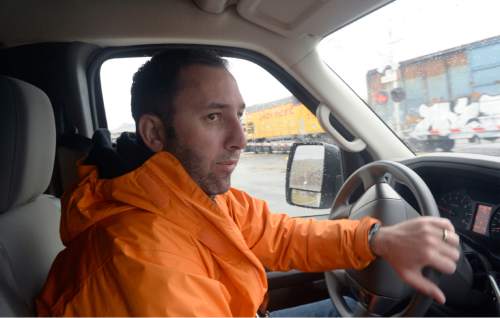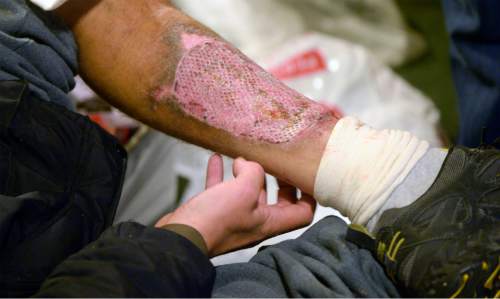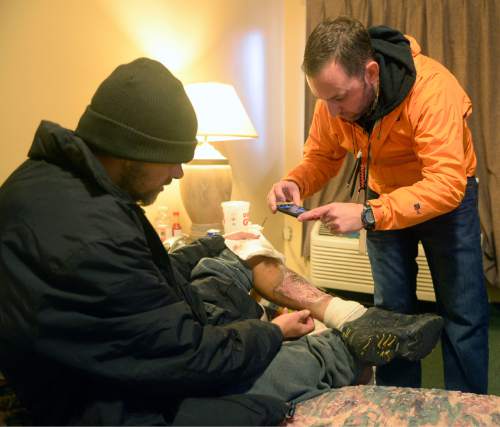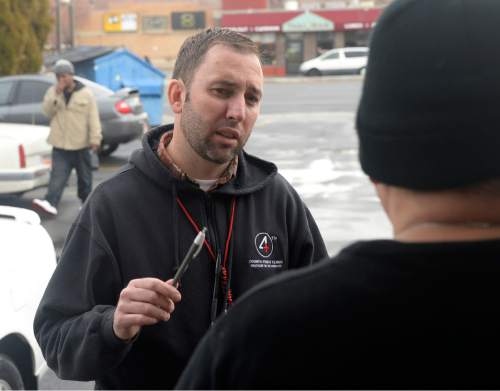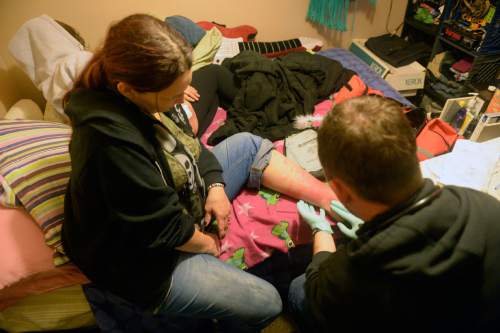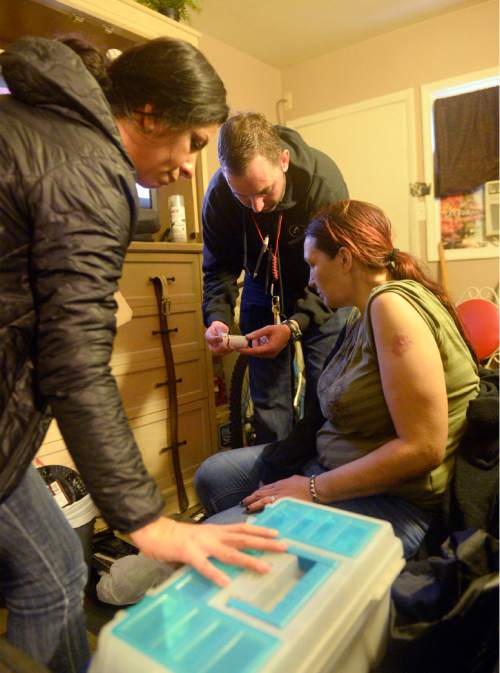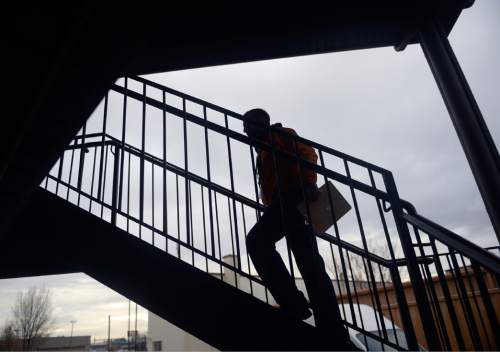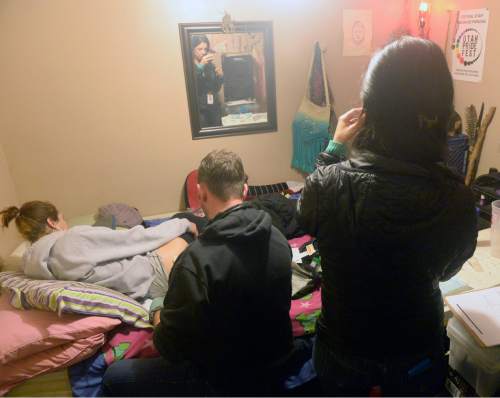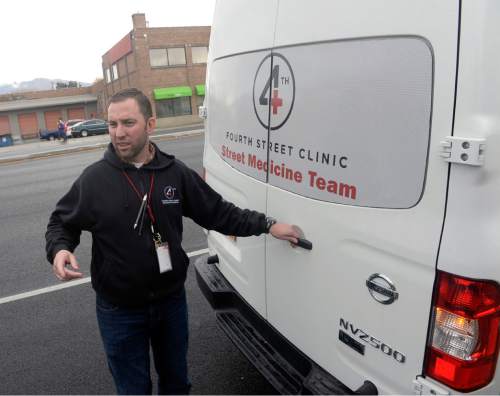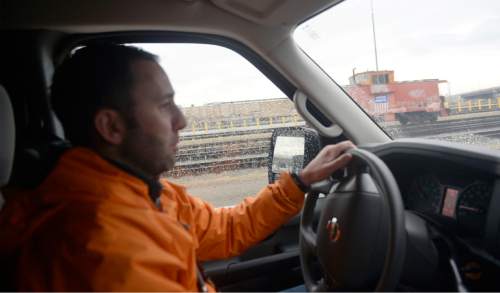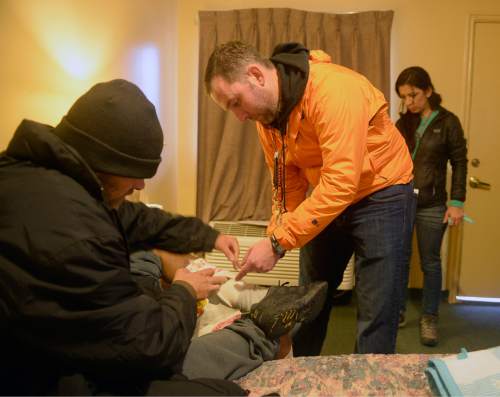This is an archived article that was published on sltrib.com in 2014, and information in the article may be outdated. It is provided only for personal research purposes and may not be reprinted.
Alex rests on her side, holding a cigarette in one hand and wincing as Leticia Vasquez and Phil Taylor examine the large abscess on her butt.
She lies on a double bed in a cramped room at a central Salt Lake City motel, a place she and Angel — a street name — pay $240 a week to live in, money they earn doing odd jobs and prostituting themselves.
"We consider ourselves middle-class homeless," jokes Angel, gesturing around her "home," where on this day the Fourth Street Clinic homeless outreach team — Taylor, a nurse practitioner, and Vasquez, a medical assistant — are making a house call.
Abscesses like Alex's are common among drug abusers who inject heroin in various body parts, says Taylor, who numbs her with a shot and then inserts a short tube of plastic that will drain the pus over the next several days.
When he and Vasquez finish bandaging Alex, advising her to change the dressing every few hours, they turn their attention to Angel.
She has a bright red rash just above her ankle, and her foot is swollen. Alex had kicked her out, but now she's returned to see "the doc," as she calls Taylor.
The outreach team knew to come because the women gave them a call. "They'd never come into the clinic," he says.
Taylor suspects Angel has cellulitis, an infection of the soft tissue, and he goes to the van for two antibiotics that should kill the bug.
Abscesses and skin infections are among the most common ailments the outreach team sees as they drive around the Salt Lake Valley, finding homeless people on the streets or in restaurants, in camps along the river, living in vans or in run-down motels on State Street or Third West in Salt Lake City.
The Fourth Street Clinic, kitty-corner from Pioneer Park in downtown Salt Lake City, provides free medical care to more than 4,000 homeless people a year, but those who walk through the doors generally want treatment.
Taylor and Vasquez look for those who don't.
They call them "service resistant," but Vasquez explains that they are people who feel unwanted.
"Most of them think nobody cares about them," says Vasquez, who has worked as an outreach worker for two years, first with Taylor's predecessor, Joel Hunt, and since October, with Taylor.
What she and Taylor do, she says, is annoy them by dropping by regularly and demonstrating that they do, indeed, need care.
Week before last, they met a 27-year-old sex worker at a fast-food restaurant on North Temple. She had just had a caesarean section and angrily walked out of a hospital because her baby was taken away. The child had tested positive for illegal drugs.
In the back of the clinic's outreach van in the restaurant parking lot, Taylor inspected the woman's abdomen staples, but asked her to come to the Fourth Street Clinic for a follow-up. She never showed up, so on a morning last week, Taylor and Vasquez return to the restaurant. They don't find her.
They also don't find Bill, who has asthma, when they go by his Ford Econoline van parked at the back of a commercial lot. It's early in the month, and Bill's Social Security check may have paid for a few nights in a motel, Taylor says.
Persistence sometimes pays off.
On this morning, they visit Rob Bradford, 36, the same age as Taylor and Vasquez, in a motel where the Fourth Street Clinic is putting him up.
Bradford is recovering from two surgeries at the University of Utah Burn Center, where he had skin grafts to repair damage he suffered in a car accident more than a year ago. Bradford says he was treated after the accident, but had no insurance or money to pay for more skin grafts. He and his wife, he says, were evicted after the accident.
Taylor says it took months of stopping by the corner where Bradford panhandles near Fashion Place Mall in Murray to persuade him he should have his burns examined.
His legs were hurting and swelling and Taylor suspected infection, so one day he told Bradford he'd made him an appointment at the burn center. Bradford finally agreed.
"You wait for those golden moments when people are ready," says Taylor.
On this visit, Taylor inspects Bradford's legs and says they have the pretty pink color of healing skin. Bradford holds the side of his face because of a severe toothache, and the two discuss his dental appointment at the clinic in two days.
Bradford says he's worried the grafts won't be successful. "I'm just lacking confidence it won't go south," he says.
The outreach workers check on Bradford every two days, but they see other homeless patients only occasionally.
They try to find and treat sex workers on Mondays, go regularly to the Salt Lake County Jail to treat their patients there, and Taylor spends two half-days in the clinic.
He knows to call his patients early in the month because they're more likely to return calls when they still have minutes on their government-provided cell phones.
Vasquez is key because people often will open doors to a woman that they would not open to him, Taylor says.
"This is the best job in the world," says Taylor, who worked as a registered nurse before going to graduate school. He loves that he's outside, on the move all the time.
Angel, the woman with the skin infection, draws a circle in the air, describing the cycle that keeps her and Alex supporting their life in a dumpy motel, doing drugs, selling sex.
"You gotta be on the drugs to get through it," she says. "It's a Catch 22, it sure is."
The Fourth Street's medical team, however, "never judges us," she says. "If it wasn't for this outreach team coming to us, we'd never get medical care."
Fourth Street Clinic can use donations year-round, not just in the season of giving, but it has sponsors who are doubling any donations made through Wednesday. The sponsors have pledged up to $200,000 for the campaign, which started Monday.
Go to the clinic's website, fourthstreetclinic.org, to make a secure donation. Or mail donations to: Fourth Street Clinic, 409 W. 400 South, Salt Lake City, UT 84101.
Twitter: @KristenMoulton —
How to give:
P Fourth Street Clinic can use donations year-round, not just in the season of giving, but it has sponsors who are doubling any donations made through Wednesday. The sponsors have pledged up to $200,000 for the campaign, which started Monday.
Go to the clinic's website, fourthstreetclinic.org, to make a secure donation. Or mail donations to: Fourth Street Clinic, 409 W. 400 South, Salt Lake City, UT 84101.


